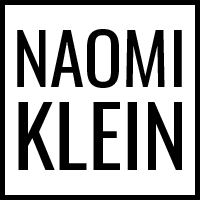An award-winning journalist of nine books, Naomi is a regular columnist for The Guardian.
Attack from the Seams: Lessons from Porto Alegre
February 11th, 2002
By Naomi Klein
On the first day of the World Social Forum in Porto Alegre Brazil, the hallways were buzzing with rumours of defections from the North. Top delegates were jumping ship from the World Economic Forum in New York and coming to Porto Alegre instead: a European prime minister, World Bank directors, even corporate executives.
Some never showed up, others did. But debates raged nonetheless about what it all meant. Was it evidence of the Forum’s new strength (it attracted some 60,000 participants, after all) or a sign of imminent danger? The World Social Forum was founded last year as an alternative to the annual gathering of the top 1,000 corporations, world leaders and opinion-maker who usually meet in Davos, Switzerland but this year met in New York City.
But with these new high-powered arrivals, the WSF now risked turning from a clear alternative into a messy merger: teams of photographers trailed politicians; market researchers from PricewaterhouseCoopers trolled hotel lobbies, looking for opportunities to "dialogue"; students threw a cream pie at a French minister.
It was much the same muddle in New York, with NGOs acting like corporations, corporations rebranding themselves as NGOs, ...
History is Back with a Capital H
December 19th, 2001
By Naomi Klein
Since the release of The Video, Osama bin Laden’s every gesture, chuckle and word has been dissected. But with all the attention on bin Laden, his co-star in the video, identified in the official transcript only as "Shaykh," has received little scrutiny. Too bad, since no matter who he is (he is most commonly identified as the Saudi mujahedin Khaled al-Harbi), he offers a rare window into the psychology of men who think of mass murder as a great game.
A theme that comes up repeatedly in bin Laden’s guest’s monologues is the idea that they are living in times as grand as those described in the Koran. This war, he observes, is like "in the days of the prophet Muhammad. Exactly like what’s happening right now." He goes on to say that, "it will be similar to the early days of Al-Mujahedeen and Al-Ansar (similar to the early days of Islam)." And just in case we didn’t get the picture: "it is the same, like the old days, such as Abu Bakr an Othman and Ali and others. In these days, in our times."
It’s easy to chalk up this nostalgia ...
The Cost of a Really Great Border
December 12th, 2001
By Naomi Klein
Last weekend, while crossing the border back to Ontario from Buffalo, our car was stopped by a customs officer. "What were you guys doing in the States?" he asked. "Do any shopping?" "Okay, have a great day."
Nothing strange here, except for one detail: this man had a U.S. flag on his sleeve. He stopped every car before waving them on to Canadian border guards who repeated the process all over again. It felt like a glimpse into Fortress North America, a not so distant future in which U.S. security officers are the gatekeepers not just of the U.S. border but of the entire continent.
Post September 11, many Canadians see some border integration as the unavoidable price of protecting our $700-billion annual trade relationship with the U.S. Exports now make up 43 per cent of Canada’s GDP, up dramatically from 25 per cent a decade ago. Eighty seven per cent of those exports go directly to the U.S. With almost half of our economy now directly dependent on an open border, it’s difficult to see how Canada can stand up to U.S. pressure.
But as Monday’s budget shows, Canadians are ...
The Next G8 Summit Won't Look Like the Last One
November 28th, 2001
By Naomi Klein
Economic Apartheid and Resistance in South Africa
November 21st, 2001
By Naomi Klein
On Saturday night, I found myself at a party honouring Nelson Mandela and raising money for his children’s fund (I’m still trying to figure out how I ended there). It was a lovely affair and only a very rude person would have pointed out that the party was packed with many of the banking and mining executives who refused to pull their investments out of apartheid-run South Africa for decades.
Mr. Mandela was in Canada this week to receive the highest honour my country has to offer: he was the second person in our history to be made an honorary citizen. So only someone with no sense of timing would have mentioned that, as the Liberal government was honouring Mr. Mandela, it is ramming through an anti-terrorism bill that would have sabotaged the anti-apartheid movement on several fronts had it been in place at the time. (Many other countries are passing similar laws.)
The anti-apartheid movement here in Canada and elsewhere actively raised money for the African National Congress, which would easily have fit most anti-terrorism bills’ sloppy definitions of a terrorist organization. Furthermore, anti-apartheid activists deliberately caused "serious disruption" to the ...
The Most Multilateral of Moments
November 16th, 2001
By Naomi Klein
This weekend, Pakistan President Pervez Musharraf asked the U.S. to show a little love in return for his cooperation. Specifically, he is fixated on some F-16 fighter jets, sold to Pakistan and then withheld because the country was developing nuclear weapons.
It’s the kind of back-scratching diplomacy we’ve come to expect since September 11: an aid package here, a loan there. And then there are all the smarmy understandings that the U.S. will look the other way when the Chinese or Indonesian militaries beat back liberation movements within their borders, since all state repression seems to be part of the war on terrorism now.
Are these back-room pay-offs and gentlemen’s agreements really going to be the only legacies of September 11, or is there more the world community could be demanding during this, the most multilateral of moments?
Facing an enemy that respects no border, the Bush administration has made many demands of the world community since September 11: military support, intelligence information, police force cooperation, and the collaboration of financial institutions. It has asked for the harmonization of border controls and of airport security. It has requested land bases, air ...
Doha's Kamikaze Capitalists
November 7th, 2001
By Naomi Klein
What do you call someone who believes so firmly in the promise of salvation through a set of rigid rules that they are willing to risk their own life to spread those rules?
A religious fanatic? A holy warrior? How about a U.S. trade negotiator.
On Friday, the World Trade Organization begins its meeting in Doha, Qatar. According to U.S. security briefings, there is reason to believe that al Qaeda, which has plenty of fans in the Gulf state, has managed to get some of its operatives into the country, including an explosives specialist. Some terrorists may even have managed to infiltrate the Qatari military.
Given these threats, you might think that the U.S. and WTO would have canceled their meeting. But not these true believers.
Instead, U.S. delegates have been be kitted out with gas masks, two-way radios and drugs to combat bio-terrorism (Canadian delegates have been issued the drugs as well). As negotiators wrangle over agricultural subsidies, softwood lumber and pharmaceutical patents, helicopters will be waiting to whisk U.S. delegates onto aircraft carriers parked in the Persian Gulf, ready for a Batman style getaway.
It’s safe to ...
Battle Boring
October 24th, 2001
By Naomi Klein
Just hours after the terrorist attacks on the World Trade Centre and the Pentagon, Republican Representative Curt Weldon went on CNN and announced that he didn’t want to hear anyone talking about funding for schools or hospitals. From here on it, it was all about spies, bombs and other manly things.
"The first priority of the U.S. government is not education, it is not health care, it is the defense and protection of U.S. citizens," he said, adding, later: "I’m a teacher married to a nurse—none of that matters today."
But now it turns out that those frivolous social services matter a great deal. What is making the U.S. most vulnerable to terrorist networks is not a depleted weapons arsenal but its starved, devalued and crumbling public sector. The new battle fields are not just the Pentagon, but also the post office; not just military intelligence, but also training for doctors and nurses; not a sexy new missile defense shield, but the boring old Food and Drug Administration.
It has become fashionable to wryly observe that the terrorists use the West’s technologies as weapons against itself: planes, email, cell phones. But ...
Bye Bye Mike Harris
October 17th, 2001
By Naomi Klein
For almost a year, I carried Premier Mike Harris’s $200 tax cut in my wallet. Its edges frayed and the ink began to smudge. I looked at it from time to time, then put it away.
Refuse to cash it—what does that prove? The money had already been taken out of public accounting. It’s not like my uncashed cheque was going to go to a high school teacher’s salary or to a homeless shelter. Many people, confronting this dilemma, gave their tax cuts to charity, trying to plug some of the gaping holes in the social fabric left by Mr. Harris’s cuts.
But I decided to be more proactive: I gave the money to the Ontario Coalition Against Poverty (OCAP), the most committed Harris haters this province has to offer. So there was a certain poetic justice to yesterday’s news: a militant anti-Harris demonstration, organized by OCAP, turned into a street celebration of Mr. Harris’s resignation. Victories are rare these days, they must be savoured.
I know, I know: Mike Harris wasn’t forced out, certainly not by OCAP. He chose to spend more time with his family. And yet there is ...
Signs of the Times
October 5th, 2001
By Naomi Klein
As shocking as this must be to New Yorkers, in Toronto, the city where I live, lampposts and mailboxes are plastered with posters advertising a plan by antipoverty activists to "shut down" the business district on October 16. Some of the posters (those put up before September 11) even have a picture of skyscrapers outlined in red — the perimeters of the designated direct-action zone. Many have argued that O16 should be canceled, as other protests and demonstrations have been, in deference to the mood of mourning — and out of fear of stepped-up police violence.
But the shutdown is going ahead. In the end, the events of September 11 don’t change the fact that the nights are getting colder and the recession is looming. They don’t change the fact that in a city that used to be described as "safe" and, well, "maybe a little boring," many will die on the streets this winter, as they did last winter, and the one before that, unless more beds are found immediately.
And yet there is no disputing that the event, its militant tone and its choice of target will provoke terrible memories ...



